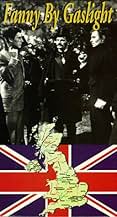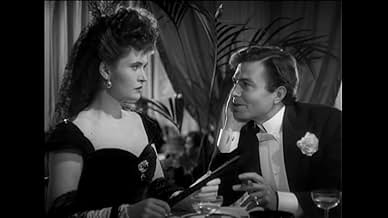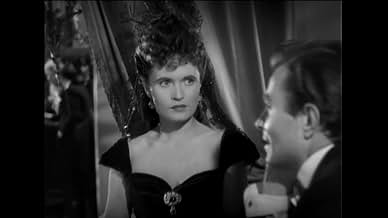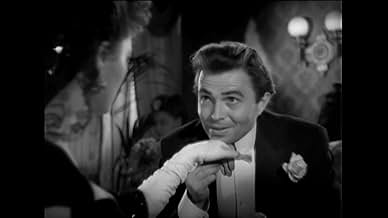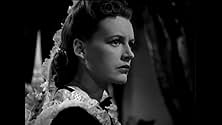Adicionar um enredo no seu idiomaFanny's father dies in a fight. Her family runs a brothel. Her real father is a politician. She falls for his advisor Harry. Lord Manderstoke's interference causes conflicts between classes.... Ler tudoFanny's father dies in a fight. Her family runs a brothel. Her real father is a politician. She falls for his advisor Harry. Lord Manderstoke's interference causes conflicts between classes. Tragic events occur due to the Lord's schemes.Fanny's father dies in a fight. Her family runs a brothel. Her real father is a politician. She falls for his advisor Harry. Lord Manderstoke's interference causes conflicts between classes. Tragic events occur due to the Lord's schemes.
- Direção
- Roteiristas
- Artistas
- Maid
- (não creditado)
- Direção
- Roteiristas
- Elenco e equipe completos
- Produção, bilheteria e muito mais no IMDbPro
Avaliações em destaque
'Fanny By Gaslight' does try - it manages to get subject matter into it that must have seemed very daring in the 1940s, it starts well and grows into some good scenes between Fanny ('only Hooper') and her employer's wife. Then - perhaps because of Granger, IMO - it starts to backfire badly and become a bore. A great disappointment.
This film is a lovely story...very much like an old fashioned love story. This is NOT meant as an insult...such stories can be very satisfying if well written and the characters enjoyable...which they definitely are here.
Of course it is Phyllis Calvert as Fanny who dominates the film, ably supported by a well-chosen supporting cast. I much regret that my favorite contemporary British director, Ken Russell, was never able to realize his last major project -a new version of "Moll Flanders", but seeing this 1944 costume picture some 80 years after courtesy of YouTube makes up for it thanks to a very fine British print.
My original intention was to see James Mason and Stewart Granger face off against each other. Instead, I found myself falling in love with the heroine played by Phyllis Calvert, who immediately became my favorite British actress.
The story may smack of soap opera; I've followed several in my time, and yet this story, admittedly overdone, I found to be very sympathetic, and immediately found myself falling in with the main protagonist, and wishing her to eventually prevail, despite all the adversity she had to face from so many individuals.
I have continued to love this movie and have gone back to seeing it many times. I admit that Stewart Granger is rather wooden at times and James Mason appears only at certain strategic moments. However, the player whom I found myself yearning more to see was Jean Kent; fortunately for her, she was given full opportunity to display her complete diversity in subsequent films, many of which I have also seen. (I would like to comment that Ms. Kent is happily still with us, approaching 90 as of next year.)
I agree that the moment where Stuart Lindsell as Fanny's natural father is about to kill himself because of pressures exerted by his erstwhile wife having become too much is right out of a horror story, at the moment where one sees those multiple mirror images.
Certain other players in this film I have also found to be quite believable considering the context - Wilfrid Lawson as Chunks, Amy Veness as Mrs. Heaviside, and perhaps one or two others.
In addition to James Mason, the individual contributions by Margaretta Scott and Cathleen Nesbitt are also sufficiently believable to invite our intense dislike, as each throwing another obstacle in the path of our heroine.
I understand that these impressions are purely individual; as with any work of art, we experience such in our own way. In my case, it made a very warm, positive impression on me - I cannot say exactly why. I would recommend it to anyone who likes high Victorian melodrama, mindful that I am not necessarily in a majority with my impression, but that is how I am. Chacun e son gout, as they say.
I just finished viewing Madonna of the Seven Moons, another film in this same Gainsborough series, and also featuring Phyllis Calvert, Jean Kent,and Stewart Granger. While this latter is a fascinating story based upon a multiple personality, I found it to be inferior in its cohesiveness and ability to draw the viewer in, compared with Fanny by Gaslight, which I have just commented on. I could easily imagine that the superior direction by Anthony Asquith may have something to do with it.
The script is full of Dickensian touches, notably in respect of class differences, and the pace is well controlled throughout.
I find beautiful Phyllis Calvert to have one of of her better parts in this film. Versatile James Mason unfortunately has only a small part but it is a memorable one. The scene of the duel challenge with Stewart Granger is one of the best of any British movie I have watched, and I have watched many because I am a fan of the British cinema, especially the 1935-1970 period.
Finally, the exceedingly beautiful B&W photography, exquisite beyond words.
Anyone who enjoys Dickensian drama MUST see FANNY BY GASLIGHT. 8/10
Você sabia?
- CuriosidadesThe film was originally banned in the USA because it transgressed the Hays Purity Code.
- Citações
Clive Seymour: Fanny. I don't know how to begin to tell you this. I promised your mother. William Hopwood was not your father.
- Cenas durante ou pós-créditosOpening credits prologue: LONDON
1870
- ConexõesFeatured in The Ultimate Film (2004)
Principais escolhas
- How long is Man of Evil?Fornecido pela Alexa
Detalhes
- Tempo de duração1 hora 47 minutos
- Cor
- Proporção
- 1.33 : 1
Contribua para esta página


